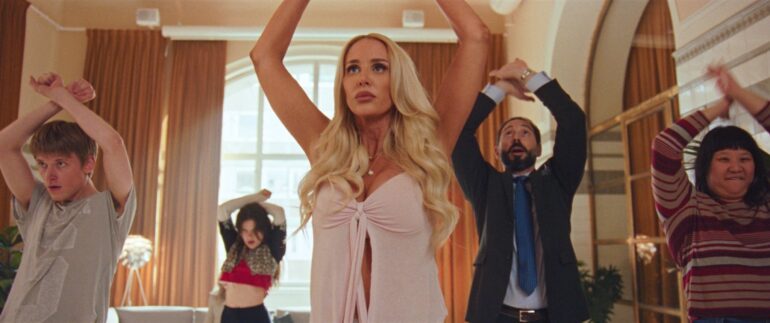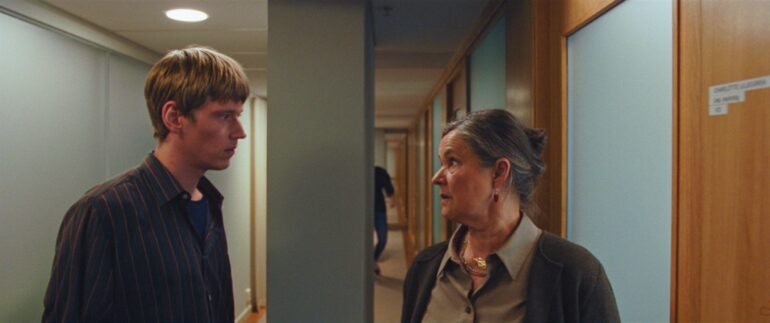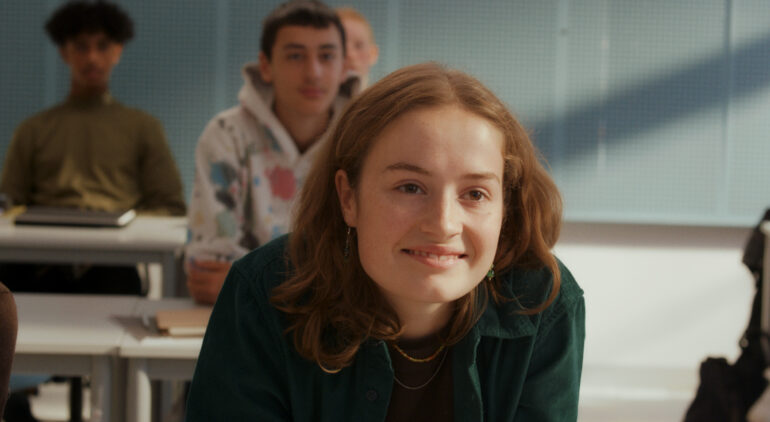WRITTEN BY: Mariana Hristova
Lisa Langseth talks about the realities behind her thought-provoking comedy. Artistic Director Sonora Broka explains why the Nordic selection’s nine features matter to the audience.
Riga International Film Festival’s Nordic Highlights strand returns with nine films that reflect how the region continues to examine its own societal fractures through humour, melancholy, and bold formal play.
Among them, the NFTVF supported The Dance Club by Lisa Langseth stands out with a critically ironic plot about a psychology intern who pushes back against the private clinic he works for, refusing to endlessly hand out prescriptions without addressing the real causes behind his patients’ struggling mental health. Framed as a “romantic comedy”, the film offers an audience-friendly surface layered with alarm over Sweden’s rapid societal transformation.
Langseth connects the strong social commentary of her film, related to the commodification of psychological care, with a dramatic shift happening in Sweden. “I think Sweden is changing very fast at the moment. We used to be very good and kind, and we had a strong welfare system, one of the best in the world.”
However, the director explains that privatisation has produced a crisis inside previously reliable structures. “Now private companies get tax money to ruin society. We sold it out, and it is the same with schools, healthcare, and so on. This company care model is the prototype of the system.” She adds: “Now we have more street shootings than the rest of Europe. Suddenly we have big problems, while the outside world still thinks everything works very well.” She observes “a feeling that society is falling apart inside, while politicians say everything is on the right track. Still, people get shot, there are more drugs in schools. It is changing significantly.”
The Dance Club focuses on the failings of psychiatric care within that larger picture. “I wanted to dig precisely into the psychiatric world, because they are the ones who define normality at the moment. The church has no power anymore in Sweden, society is very flexible, and we have lost shared moral structures. We don’t trust anything anymore.”
She sees diagnoses and medication becoming market-driven tools. “Society is moving fast, and medication becomes a way for people to keep functioning if life is too hard. It is very frightening.”
Langseth’s script incorporates the creeping automation of emotional support. “We want easy solutions, and it is increasingly common to ask others what we should do about things. Whether a chatbot, a therapist, or anyone. This whole culture of coaching.”
The mention of the possible introduction of AI psychologists in the film reflects this. “In Sweden we love technology, and we are always the first to adopt it, even bad things. All the streamers, Spotify, everything. We love chatbots, and want them to tell us how to feel.”
Despite portraying mental health services as a cold machine, she locates the root cause elsewhere: “Everyone wants someone to see them for who they are. That is a basic instinct we have from childhood. This instinct for connection has been lost for many reasons. There is also a lot of money to be made from people’s longing.”
Her observational research turned up disturbing realities behind the system, and some of the script’s harshest dialogues come directly from real institutions. “All the lines from Pernilla August’s character are real quotes from someone I met. For example, about the patients with too big problems, who are not welcome, as they cost too much money. People with severe conditions end up on the streets because no one can profit from helping them.”
Amid that cynicism, dance becomes a mode of personal and collective liberation in the film. “What you can know is that you have a body. To do something with the body helps you come back to yourself,” explains Langseth. She was initially concerned the idea might appear “silly or cheesy”, then embraced its potential: “I wanted my characters to do something stupid, which, however, helps them to connect with themselves. It is funny, refreshing, and absurd within the context.”
Eventually, Lisa Langseth’s approach captures what Riga audiences repeatedly find in Nordic cinema: humour used not to soften social critique, but to sharpen it.
On the festival’s specific strategy towards introducing Nordic cinema in the Baltics, Nordisk Film & TV Fond also managed to speak to its Artistic Director Sonora Broka. She describes the annual programme as “the second most popular section of the festival programme, with a loyal audience, for whom the names of the directors of the films included in the section are mostly already well known”.
The section was first introduced at the festival in its second year, 2015, and so far, 108 Nordic films in total have been screened in the section, while another 9 will join them this year. Part of the audience had their first encounter with Nordic cinema back in the days, and their cinematic tastes have been shaped by the films of Bent Hammer, Roy Anderson, Aki Kaurismäki, and Lars von Trier.
“We are pleased to continue this tradition by also showing works by middle and new generation Nordic filmmakers in Riga,” adds Broka, and further elaborates that “the stories, visual aesthetics, and perhaps the worldview of Nordic cinema often seems more relatable to Latvian viewers than, for example, Southern or Eastern European cinema, which is evidenced by both the good attendance at screenings and the reviews after screenings.” As described in the festival website, the section forms “a tableau that reveals the Nordic mode of cinematic creation and storytelling – one that is very familiar to the people of the Baltics in terms of pace, vibrancy, mood, and, of course, humour”.
The programme spans the entire Nordic map. From Norway it showcases Dag Johan Haugerud’s Dreams (Drømmer) and Love (Kjærlighet), while Denmark is represented by Mathias Broe’s Sauna and Jeppe Rønde’s Acts of Love (Kærlighedens gerninger). Iceland contributes with Hlynur Pálmason’s The Love That Remains (Ástin Sem Eftir Er), Swedish cinema brings Pella Kågerman and Hugo Lilja’s Egghead Republic together with Langseth’s title and the Swedish-Finnish co-production Raptures (Rörelser) by Jon Blåhed, and Finland completes the selection with Lauri-Matti Parppei’s A Light That Never Goes Out (Jossain on valo joka ei sammu).
Dreams, Love, The Love That Remains and The Dance Club are supported by NFTVF.



